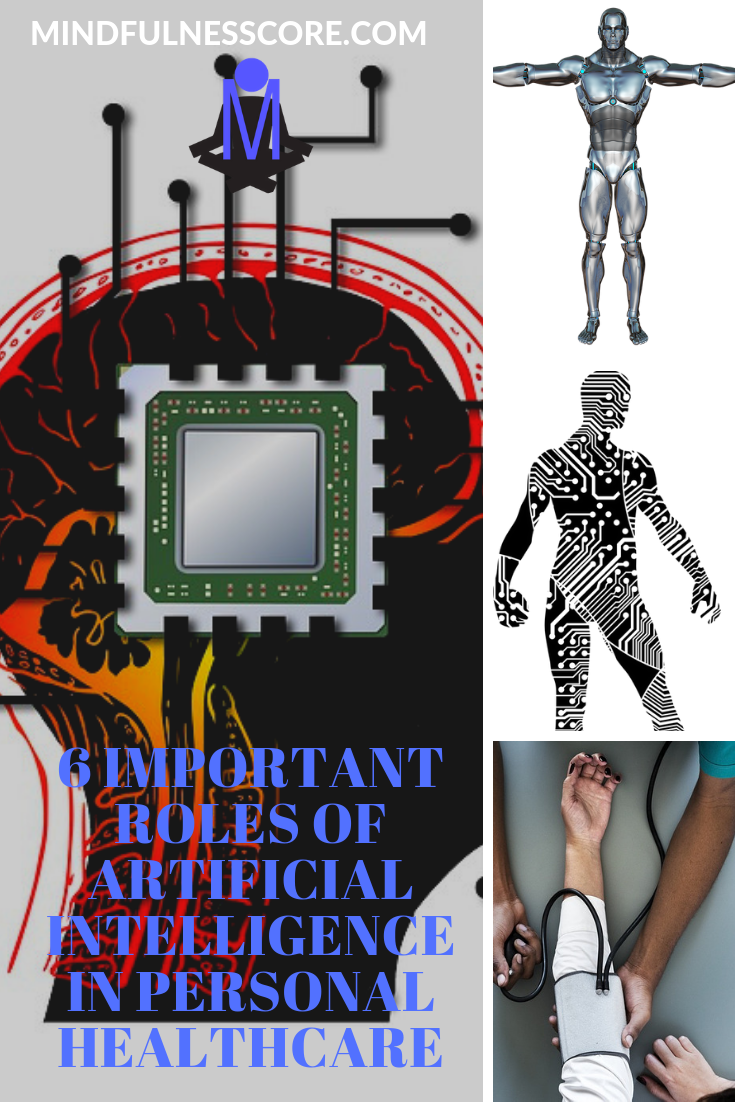6 Important Roles of Artificial Intelligence in Personal Healthcare

Artificial Intelligence (AI) has certainly been a game-changer in the world of technology. If you put your head to it, you’d be amazed to know that things as simple as the toaster you use every morning is using artificial intelligence in this time and age. Healthcare and Technology are usually considered worlds apart. However, the benefits of artificial intelligence are so pronounced that they are penetrating the healthcare services as well in hopes of improving the outcomes for the patients. Be it a mean for better and efficient communication between the healthcare provider and the patient, or storage, accessing, retrieval, or analysis of huge chunks of patient data, Artificial Intelligence has already made its mark in the healthcare industry.
With artificial intelligence, it is now possible for the machines to support a clinical diagnosis that has been made by a physician. For the patient, it means an instant second opinion for his medical condition. Thanks to the technological advancements, AI-powered robots can serve as assistants for complicated surgeries with a precision that is unmatched for a human being and are powerful enough to foresee a cardiac arrest before it occurs that helps a great deal in preventative medicine. All in all, Artificial Intelligence is revolutionizing the healthcare industry in terms of improving care delivery, making hospital operations more seamless and efficient, and optimizing the clinical specialties.
Here are a few of the prominent ways in which Artificial Intelligence is improving the physical and mental health services outcomes. Truth is, there’s a lot that is still to be explored as far as the application of artificial intelligence in healthcare is concerned. To give you an idea, however, we have highlighted a few of the conspicuous benefits that AI has already rendered to the health systems across the world.
1. Efficiency And Precision
The role of Artificial Intelligence in healthcare goes way beyond a second opinion for diagnosis. The AI-powered machines are able to store an unlimited amount of data about the previous cases. Such data from around the globe can be accessed in real-time which enables a much faster and accurate diagnosis of the medical conditions. This is particularly useful when there is a risk of worsening if immediate action is not taken, for instance, in the case of malignant melanoma. The most advanced AI solutions have enough processing power to compute large chunks of healthcare data in a matter of minutes or even seconds and transform this data into useful information that helps in making efficient and precise diagnosis of the patient and immediate initiation of the required treatment that works to improve the likelihood of saving lives to multiple folds.
2. A Cure To Human Errors
To err is human. It’s unfortunate but true. It could be any number of reasons that can make your surgeon commit a mistake that can turn out to be life-threatening for you. This is specifically true for the more advanced and complicated surgeries which cast an enormous pressure over the surgeon. The possibility of an error due to excessive stress, however, can be ruled out with the use of AI-powered robots which constantly monitor the process and compare it to the standard for the purpose of notifying immediately in an event of an anomaly. What’s more, is that these robots can also serve as assistants and be actively involved in the process of surgery that further enhances the precision and minimizes the risk of an error. One good example of artificial intelligence in robotic surgeries is that of Smart Tissue Autonomous Robot (STAR). It has the potential to suture stitches that are remarkably more accurate and cleaner as compared to the one done by the surgeon himself. The use of STAR is also anticipated for the removal of tumor tissues as it has been predicted that with minimal damage to the local tissues, the risk of infection can be eliminated with an added benefit of faster healing.
3. Cost-Effective Solutions
There is no argument over the fact that time and financial constraints are among the leading cause behind ignorance towards healthcare. With Artificial Intelligence, however, virtual assistants are always available at patient’s disposal which is not only effective in providing the basic care but is also an impeccable platform via which patients can keep their physicians up-to-date with their condition by frequently entering their health-related information. This is what enables the doctor to remotely monitor and evaluate the health of his patients. Test reports can be discussed and recommendations can be made without the patient having to visit the healthcare facility via the Telemedicine solutions. Such convenience is effective in making healthcare delivery more affordable. The Telemedicine services further ensure greater access for the patients of the rural areas that are deprived of any nearby healthcare facility.
4. A Focus On Preventive Care
Lastly, Artificial Intelligence has the potential to shift the focus of healthcare services from reactive care to preventive care. Rather than waiting for the initiation of the treatment after the disease presents itself, Artificial Intelligence enables the healthcare professional to make a thorough analysis of the patient’s medical history. It also serves to highlight the high-risk markers for a range of medical conditions. Thanks to AI, spotting the at-risk patients has never been easier. With consistent monitoring of such patients, AI is now capable of suggesting the appropriate medical interventions in an event that the symptoms are alarming.
5. Time Effective Health Systems
One of the greatest benefits of incorporating artificial intelligence into the health facilities is that of saving enormous amounts of time which can then be utilized in a more productive fashion to improve the overall health outcomes for the public. Think of it in terms of administrative duties which take up a huge chunk of employees’ time even for the tasks as small as handling all the paperwork. Documenting the patient’s information, storing them in files, keeping them organized in the cabinet, making and discussing the schedules of the health professionals, creating a reliable network of communication between such professionals and the administrative employees has never been as smooth, convenient, and time effective as it has now become with the use of artificial intelligence.
Thanks to the use of AI-based software and applications, a wide range of the administrative tasks can now be performed much efficiently with minimal effort by the employees. With such solutions, a health facility can make sure that the health providers can keep their focus on their patients rather than being stuck with all the paperwork that works as nothing but a distraction.
6. Better Security
In terms of security, mental health services are a better example when it comes to highlighting how artificial intelligence has been revolutionizing the world of healthcare. There is no denying the fact that we are unfortunately still living in the times of strong social stigma associated with mental health. There may be a lot of us on the social networks advocating for the importance of mental health and lending a hand to those who are in need, and yet, there hasn’t been a dramatic improvement in terms of the outcome so far.
For people who may be concerned with such a social stigma that may have been disabling them from reaching out to the professionals in times of need, the artificial intelligence based telepsychiatry solutions are an impeccable option. In this time and age, we are almost always on our cell phones, laptops, and other such gadgets. Wouldn’t it be amazing if we could reach out to the mental health professionals via the same outlets and get help? Nobody has to know that you are fighting a battle against mental health. This is exactly what is being accomplished with telepsychiatry solutions.
As per the research, such solutions are highly acceptable for the people and have also been shown to be effective in improving the outcomes for mental health.
Finale Note
Be it electronic health records or medical imaging diagnostics, virtual health assistance or data processing, Artificial Intelligence is working diligently for the healthcare services to improve outcomes for patients. By lending a helping hand in managing hospital workflows, choosing the right exam for every patient, and planning the procedures, AI is playing an imperative role in enhancing the physical and mental healthcare services and reducing the costs for the providers and patients alike. The efficient data processing is supporting the healthcare facilities in getting the most out of the existing resources in hopes of optimizing performance that translates into higher productivity for the hospital. With non-stop monitoring, better diagnosis, preventive care, personalized medication, and advanced treatment plan, Artificial Intelligence minimizes the risk of hospital admissions and readmissions that reduces the burden from the hospitals leading to impeccable care for the patients.
In the light of the aforementioned information, it won’t be wrong to conclude that Artificial Intelligence has made healthcare much more effective, efficient, and accurate for the patients and is likely to continue its charm in improving the physical and mental health services in the time to come.

